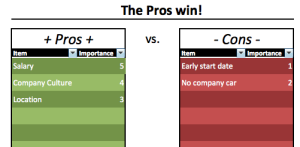How do you respond to a low salary offer when you’re stuck?
Last week, I laid out specific steps on how to negotiate a higher salary after a job offer.
So this article assumes that you’ve tried to negotiate for more money or benefits. But for some reason, the company said they couldn’t do anything else.
I know, it’s not a fun situation. It sucks.
But when that happens, you’re not all the way out of luck because you still have a few options.
Here are three different roads you can take.
Option 1: Get A Future Raise Agreed To In Writing
When the company sticks to their offer and says that’s all they can afford to pay you at this point, you’re not out of negotiation moves. One last move you can make is to bring up a future raise.
Say something along the lines of, “Since we’re not in exact agreement, if I take this offer and perform extremely well, could we set a time in the next 6 to 12 months to discuss a raise?” If the hiring manager says yes to that, you have to set a specific time to discuss this again and get this agreement in writing.
(Then be a top performer at your position. Show up early to the office and leave late. Because if you’re a valuable contributor then you’ll have a better chance of receiving the raise you agreed to.)
Option 2: Take The Job And Make Due
If you love the work and it’s worth taking a pay cut for, then take the job without any regrets.
Just realize that your monthly budget will probably be tight and you’ll have to sacrifice in other areas. That might mean you can’t take a fancy vacation, travel as much as you like, or stay in a super nice place.
If that’s good with you, then go for it. You’ll spend far more time at work then you do at home or on vacation. And maybe you can get a promotion or raise in this role since you love it so you will be more likely to succeed.
If you don’t love the job and it’s paying below market value, then I’d go with Option 3.
Option 3: Decline The Job And Get Paid What You’re Worth
Maybe the offer is below your market value and makes it hard to live in an expensive city. If that’s the case, then it might be best to reject their offer and seek employment elsewhere.
The good news is that this isn’t the only job and company in the world. There are plenty of companies who would love to have your skills and experiences, and pay you fairly for them.
And when you go through the negotiation process this time, you’ll be a pro to get what you’re worth.
Making A Decision
If you can get a sizable raise agreed upon for six months or 12 months down the road, that settles it and it’s obvious to take the job. It gets tricky deciding between taking the job without the raise or declining the job.
Having self-awareness about who you are and your future vision is super helpful when it comes to making this decision. So if your self-awareness is solid, use that to decide.
For those of you still uncertain, here’s my closing advice.
Assuming their offer isn’t way off what you need, if the salary offer is the only thing you don’t love about the company and you can still afford to pay the bills, I’d trust your gut and take this job.
Because most often, finding a job that gives you the opportunity to grow, provides some personal autonomy, has a strong company culture, and involves a cause you believe in, leads to more happiness than a job where you only appreciate the income. And just remember, there are always creative solutions (like taking a side job or making a savings budget) to end up with more money.
However, if work is all about the money for you and you’re going to resent taking this lower than expected offer, it’s best you look for a higher-paying position. There’s nothing wrong in demanding that you get paid what you’re worth.
Ultimately this career decision is up to you and your unique situation. Best of luck!



